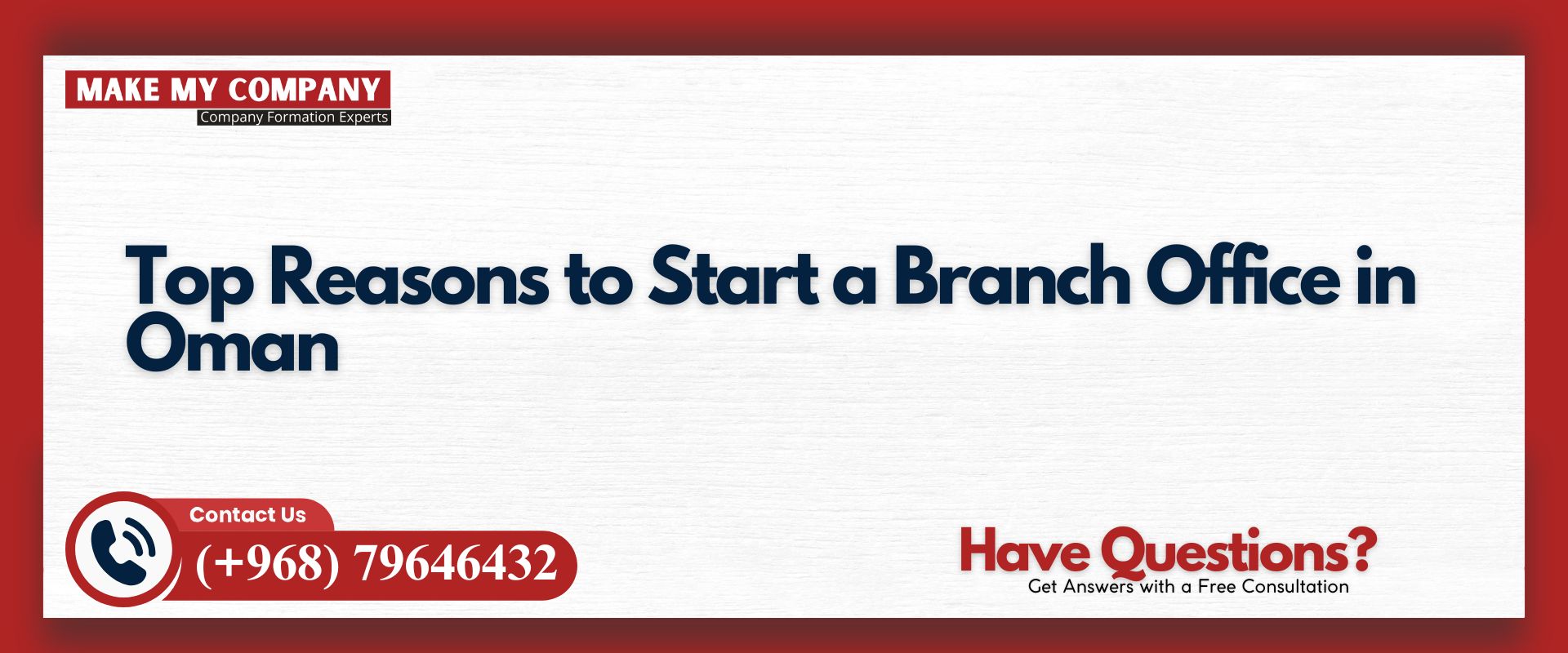If you’re thinking about expanding to Oman, setting up a branch office is one of the smartest moves you can make. Whether you’re a multinational or a growing SME, a branch office gives you legal presence, market trust, and local flexibility—all while keeping your brand identity intact.
Why Oman Is a Strategic Choice for Branch Expansion
Oman’s location, stable economy, and investor-friendly policies make it a prime destination for branch offices. It connects businesses to GCC markets, offers easy trade access, and maintains low operational costs. The supportive government environment adds to its strategic advantage for expanding businesses seeking long-term growth in the region.
Ideal Location with GCC Access
Oman’s position on the Arabian Peninsula connects you to neighboring markets—UAE, Saudi Arabia, Qatar, Kuwait, and Bahrain—without the complexity of separate entities.
Stable, Investor-Friendly Economy
With strong governance, transparent regulations, and robust diversification, Oman stands out as a low-risk, high-opportunity destination for foreign business presence.
Competitive Salaries & Operational Costs
Compared to the UAE or KSA, Oman offers a cost advantage—office rent, labor, and utilities are more affordable, allowing higher ROI for your regional branch.
What Makes a Branch Office Different from a Subsidiary
A branch office is legally part of your main company and focuses on the same activities—while a subsidiary is a separate legal entity.
Branch Office Benefits:
- No need for a separate share capital
- Easier profit repatriation
- Lower registration costs
- Strong brand consistency across borders
This structure is ideal if you’re extending your core business into Oman.
Advantages of Launching a Branch Office in Oman
A branch office in Oman helps you maintain brand identity, benefit from local credibility, and operate under your parent company’s structure. It simplifies management, reduces setup costs, and allows full profit repatriation. You gain the freedom to bid for contracts while avoiding the complexities of forming a new entity.
Seamless Business Integration
Your Oman branch operates under the same head office name, using shared systems, branding, and corporate identity.
Market Confidence & Local Trust
A local office builds credibility—and local clients feel safer working with a regulated Omani presence.
Full Repatriation of Profits
Unlike some jurisdictions, Oman allows you to send profits home without restrictions—giving you full control.
Broader Business Scope
Approved Omani branches can operate inside and outside free zones, bid for public tenders, and act as import/export hubs.
Eligibility & Legal Requirements to Open a Branch in Oman
To open a branch in Oman, your parent company must be legally established abroad. You’ll need certified incorporation documents, a local service agent, and a lease agreement. Registration with the Ministry of Commerce and other authorities ensures compliance with Omani business laws and prepares you for local operations.
Applicant Company Must Be Established
You’ll need proof of legal standing—like certificates of incorporation, board resolutions, and audited accounts.
Appoint a Local Agent (if Required)
Most branch offices require naming an Omani national or Omani LLC as a local representative.
Register With Authorities
The Ministry of Commerce (MOCI) and the Oman Chamber of Commerce (OCCI) must approve your branch activity and legal documentation.
Tenancy Contract & Office Lease
A physical office or flexi-desk with a valid Ejari contract is required before license issuance.
Step-by-Step Guide to Setting Up Your Branch Office
Start with a board resolution, appoint a local manager, and gather legalized documents. Secure a local agent, lease an office, and submit applications to MOCI. Once approved, obtain your commercial registration, tax card, and visas. This step-by-step approach ensures your branch launches smoothly and in full compliance.
Step 1 – Board Resolution & Appoint Manager
Authorize the branch from your HQ and name an Oman-based branch manager.
Step 2 – Obtain Notarized Legal Documents
Get authenticated translations of your incorporation papers and submit them to MOCI.
Step 3 – Sign Local Agent Agreement
Have your agent sign a Power of Attorney (PoA) authorizing them to act on behalf of your branch.
Step 4 – Submit License Application
File with MOCI, attach documents and the lease, and pay the licensing fee.
Step 5 – Obtain Commercial Registration & Tax Card
After review, MOCI issues your Commercial Registration (CR) and Tax Card to get you fully operational.
Step 6 – Visa Quota & Employee Onboarding
Once licensed, apply for staff visas and register your branch with OCCA.
Key Benefits of Operating as a Branch
Operating as a branch gives you brand consistency, simplified tax filing, and easier financial integration. You can repatriate profits freely, manage operations under your parent company, and build local trust. It’s ideal for expanding your services while maintaining centralized control over business policies and financial activities.
Same Legal Identity
Your brand is consistent and fully recognized in Oman.
Streamlined Reporting
Branch profits are consolidated in your HQ audit, avoiding dual reporting.
Simplified Repatriation
Send profits and dividends to home country at any time—no capital lock-in.
Flexibility in Contracts
Branches can sign contracts, bid for bids, and hire locals under Omani employment law.
Common Challenges with Branch Setup—and How to Manage Them
Challenges include finding reliable agents, understanding local laws, and meeting leasing or Omanization requirements. These can be overcome with expert advisors, legal consultants, and advance planning. Having a clear structure and support system ensures your branch avoids delays, maintains compliance, and begins operations smoothly.
Local Agent Dependence
Make sure your local agent is reliable and properly registered to avoid compliance issues.
Leasing Process
Negotiate favorable office terms and ensure the Ejari contract covers your intended use.
HR Regulations
Hire a local HR expert to handle visa rules, Omanization quotas, and labor compliance.
Bank Processes
Due diligence for opening corporate accounts can take time—preparing documents in advance helps.
Omanization & Employment Laws
Oman’s labor laws require hiring local talent under the Omanization policy. Understanding employment rules, minimum wage standards, and contract formats is key. Meeting quotas boosts compliance and credibility. Hiring local HR professionals helps ensure your branch follows employment laws and builds strong relationships within the Omani workforce.
Hiring Omani Nationals
Like other GCC countries, Oman expects foreign branches to hire a certain percentage of locals under the Omanization program.
Labor Law and Employee Contracts
Employee contracts must follow Omani law. Offer UAE-equivalent salaries and abide by leave and termination guidelines.
Working with local HR advisors ensures compliance from day one.
Taxation, VAT & Audit Obligations
Branches in Oman are subject to corporate tax and VAT if revenue exceeds the threshold. Accurate bookkeeping, regular tax filing, and annual audits are mandatory. It’s vital to engage with local accounting professionals to stay compliant and avoid penalties. This strengthens your financial credibility and operational stability.
Corporate Taxation
Oman recently introduced low-rate corporate tax—but branches are taxed at the standard rate. Consult your accountant for planning.
VAT Registration
Branches must register for VAT if revenue exceeds the threshold. Keep thorough invoices and reconcile monthly.
Audit & Financial Reporting
Annual audited financials and tax compliance documents are required. Budget for professional accounting costs.
Financing, Banking & Fund Flow
Opening a corporate bank account requires complete documentation and a solid business plan. Once set, you can receive payments, manage operations, and repatriate profits. Oman’s financial system supports foreign branches with flexible transactions, loan options, and trade finance facilities tailored to different business models and sizes.
Bank Account Opening
Choose local banks that understand branch structures. Be transparent about operations, shareholding, and employee profiles.
Corporate Financing
Branches may access Omani banking products, loans, and guarantees to support local operations.
Money Repatriation
Transfer profits back home using usual banking channels—Oman allows full repatriation after fulfiling tax obligations.
Market Entry Strategies for Your Branch Office
Use targeted marketing, joint ventures, and networking to enter the Omani market. Attend trade expos and partner with local entities for visibility. Establishing a strong local presence builds trust. Digital marketing, local SEO, and bilingual customer support also help drive engagement and brand recognition.
Local Partnerships & Joint Marketing
Team up with Omani businesses for project access and client referrals.
Attend Trade Shows & Networks
Contribute to Oman Chamber business events, industry fairs, and match-making sessions.
Digital Marketing Within Oman
Use location-based Google Ads, LinkedIn Ads, and WhatsApp business features to target Omani audiences effectively.
Sectoral Opportunities for Branches in Oman
Oman offers growth in construction, logistics, renewable energy, ICT, tourism, and education. Each sector has government support and rising demand. Identifying a niche, localizing services, and adapting to cultural needs positions your branch for success in a business-friendly, diversifying economy with global ambition.
Construction & Infrastructure
With big public projects like Haramain expansion, energy and road work branches can thrive.
Renewable Energy & Sustainability
Branches in solar, wind, and sustainable technologies align with Oman’s long-term goals.
IT & Fintech Services
Digital transformation branches offering cybersecurity, mobile apps, and fintech will gain traction.
Tourism & Hospitality
Branches in travel agencies, adventure tourism, and eco-tourism can capitalize on Oman’s tourism growth.
Operational & Administrative Best Practices
Stay compliant with regular license renewals, labor laws, and taxation. Hire a PRO service or consultant to handle paperwork, employee visas, and reporting. Maintain clear communication with your local agent and use digital tools to streamline admin tasks. Good governance ensures smooth day-to-day operations and long-term trust.
Use Local Advisors
Use Omani corporate service providers for PRO, license renewals, and regulatory updates.
Invest in Local Talent
Hire Oman nationals for sales, administration, and compliance roles—meet local quotas and build relationships.
Adopt Omani CSR
Show commitment to local communities—support local schools or environment programs to boost brand reputation.
Scaling Your Branch Into a Regional Hub
Once the Oman office is strong:
- Add export/import capabilities under the same branch license
- Open liaison offices in other GCC countries
- Launch regional digital operations out of Oman
- Build shared services centers (HR, finance) supporting Middle East operations
Oman’s centric location and infrastructure support this expansion roadmap.
Conclusion
If you’re exploring Company Registration in Oman, launching a branch office is a smart, cost-effective way to enter the GCC market. You gain local credibility, legal flexibility, operational control, and access to new opportunities—without forming a separate entity. With good planning, advisory support, and due diligence, your Oman branch can become a strong regional hub and profit center for your brand.
FAQs
What’s the difference between a branch and a subsidiary in Oman?
A branch is legally part of your parent company and follows its structure—with easier setup and profit sharing. A subsidiary is a separate legal entity with independent governance.
Do I need a local partner for a branch office?
Yes, most branches must appoint an Omani national or entity as a local service agent—but no capital share — just representation.
Are branch profits taxable?
Yes. Profits from an Omani branch are taxed under current corporate tax laws. Consult your advisors for planning.
How long does it take to set up a branch?
Typically 6–8 weeks if you have documents, local agent, and lease lined up.
Can a branch operate inside free zones?
Yes—once licensed, branches can bid on contracts in free zones and mainland areas under same license.









